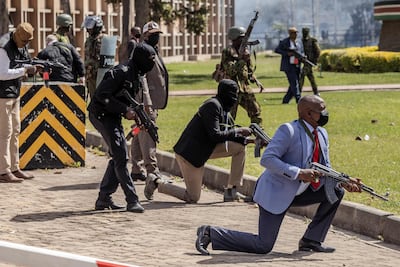At least five people have been killed and dozens wounded in Kenya after police opened fire on protesters on Tuesday, which President William Ruto called "treasonous".
Images showed bodies lying in the streets and people helping those who appeared to be severely injured.
Demonstrators were marching on the Kenyan Parliament to protest against new legislation to raise taxes.
The protests began in a carnival-like atmosphere but turned violent when some protesters broke through police lines and stormed the parliament compound, parts of which appeared to have been set on fire.
Police initially opened fire with tear gas and water cannon. Rights groups said they then opened fire, killing at least five.

The Kenya Human Rights Commission shared a video of officers shooting at protesters and said they would be held to account.
The death toll appears likely to rise. A paramedic, Vivian Achista, told Reuters at least 10 people had been shot dead.
Mr Ruto was attending an African Union retreat outside the capital when the events took place.
He later appeared in a televised address and called the storming of the parliament a security threat of "violence and anarchy".
"We shall provide a full, effective and expeditious response to today's treasonous events," Mr Ruto said in a media briefing in Nairobi.
Protests and clashes also took place in other cities and towns across the country, with many calling for Mr Ruto to quit office as well as voicing their opposition to the tax rises.
Protesters tried to storm the State House in the western city of Nakuru, a witness said.
They also burnt ruling party offices in Embu in central Kenya, the Nation newspaper reported.
Citizen TV showed footage from Nyeri in central Kenya with police confronting protesters in the streets.
In Nairobi, people chanted "Ruto must go" and crowds sang in Swahili: "All can be possible without Ruto."
Music was played from loudspeakers and protesters waved Kenyan flags and blew whistles in the few hours before the violence escalated.
They are opposed to a finance bill that was approved by parliament, which aims to raise an additional $2.7 billion in taxes.
Mr Ruto won an election almost two years ago on a platform of championing Kenya's working poor.
But he has been caught between the competing demands of lenders such as the International Monetary Fund, which is urging the government to cut deficits to obtain more funding, and a hard-pressed population.
The country is heavily indebted, with interest payments alone taking 37 per cent of annual revenue.
Kenyans have been struggling to cope with several economic shocks caused by the lingering impact of the Covid-19 pandemic, the war in Ukraine, two consecutive years of drought and depreciation of the currency.
The UK published a statement on the protests issued alongside ambassadors and high commissioners of more than a dozen countries, including the US, Canada and Germany.
"All actors have the responsibility to respect, uphold, promote and fulfil the principles of democracy, and the rule of law, particularly by ensuring a proportionate security response," they said.
"We are deeply concerned by the violence in many parts of the country during the recent protests, and are especially shocked by the scenes witnessed outside the Kenyan parliament."
The US State Department said it hoped for restraint and eventual peaceful dialogue.
"We condemn the violence reported during protests in Nairobi and around Kenya," spokesman Matthew Miller said during a briefing.
"We mourn the loss of life and injuries sustained and offer our condolences to the families who lost loved ones. We urge restraint to restore order and provide space for dialogue."
African Union chairman Moussa Faki Mahamat expressed "deep concern" over "loss of life and damage to property".
"The chairperson urges all stakeholders to exercise calm and refrain from further violence," Mr Mahamat said in a statement.
He "reiterates the total solidarity of the African Union with the government and the people of Kenya, and exhorts them to maintain peace, security and stability in the country".
Opposition leader Raila Odinga called for the Finance Bill to be immediately and unconditionally withdrawn to make way for dialogue.
"I am disturbed at the murders, arrests, detentions and surveillance being perpetrated by police on boys and girls who are only seeking to be heard over taxation policies that are stealing both their present and future," Mr Odinga said in a statement.
The government has already made some concessions, promising to scrap proposed new taxes on bread, cooking oil, car ownership and financial transactions.
"They are budgeting for corruption," said protester Hussein Ali, 18. "We won't relent. It's the government that is going to back off. Not us."
- Agencies contributed to this report




















